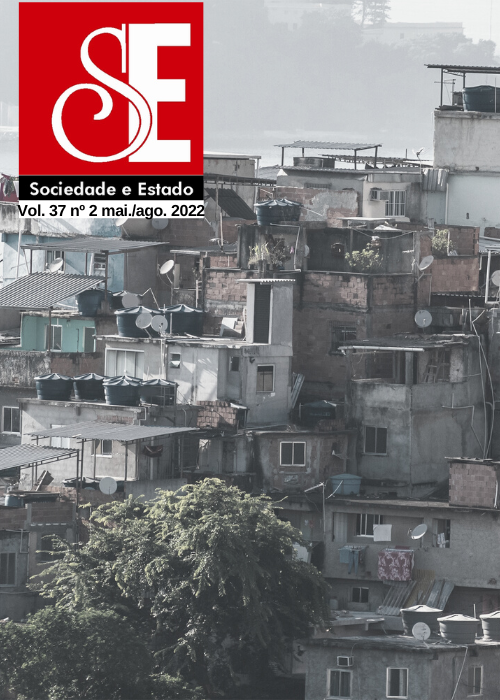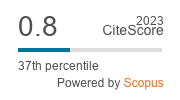Quem se abstém no Brasil? Competição local e efeito da Covid-19 na participação do eleitor no primeiro turno da eleição municipal de 2020
DOI:
https://doi.org/10.1590/s0102-6992-202237020010Palavras-chave:
eleições municipais, 2020, covid-19, competição política, abstençãoResumo
O artigo se insere na linha de pesquisas sobre participação eleitoral em disputas políticas locais. A partir de um modelo multivariado, tem o objetivo de analisar os efeitos de variáveis políticas associadas ao efeito da pandemia da Covid-19 na abstenção eleitoral das eleições municipais de 2020 no Brasil. São consideradas as disputas para prefeito de todos os 5.568 municípios com eleições municipais para responder à pergunta: onde e quem mais se absteve nas eleições de 2020? Os resultados mostram que, do ponto de vista agregado, municípios com mais mortes por Covid-19 tenderam a ter maior abstenção. Porém, o número de candidatos, usado como indicador de competição eleitoral, exerceu forte efeito contrário. No nível individual, os dados oficiais do Tribunal Superior Eleitoral (TSE) indicam que homens, com baixa escolaridade e idade acima de 40 anos tenderam a participar menos das eleições de 2020.
Downloads
Referências
ANDUZIA, Eva; CANTIJOCH, Marta; GALLEGO, Aina. Political participation and the Internet. Information, Communication & Society, v. 12, n. 6, p. 860-878, 2009.
BARNES, Tiffany; RANGEL, Gabriela. Subnational patterns of participation: compulsory voting and the conditional impact of institutional design. Political Research Quarterly, v. 71, n. 4, p. 826-841, 2018.
BIRCH, Sarah. Full participation: a comparative study of compulsory voting. Manchester, UK: Manchester University Press, 2009.
BLAIS, André. Political participation. In: LEDUC, Lawrence; NIEMI, Richard; NORRIS, Pipa (Orgs.). Comparing democracies 3: elections and voting in the 21st Century. London: Sage, 2010.
______. What affects voter turnout? Annual Review of Political Science, v. 9, n. 1, p. 111-125, 2006.
BLAIS, André; CARTY, Kenneth. Does proportional representation foster voter turnout? European Journal of Political Science, v. 18, n. 2, p. 167-181, 1990.
BLAIS, André; DOBRZYNSKA, Agnieszka. Turnout in electoral democracies. European Journal of Political Research, v. 33, p. 239-261, 1998.
BORBA, Julian. As bases sociais e atitudinais da alienação eleitoral no Brasil. Revista Debates, v. 2, n. 2, p. 134-157, 2008.
CALDEIRA, Gregory; PATTERSON, Samuel; MARKKO, Gregory. The mobilization of voters in congressional elections. The Journal of Politics, v. 47, n. 2, p. 490-509, 1985.
CEPALUNI, Gabriel; HIDALGO, Daniel. Compulsory voting can increase political inequality: evidence from Brazil. Political Analysis, v. 24, n. 2, p. 273-280, 2016.
CERVI, Emerson; BORBA, Felipe. Quem se abstém no Brasil? Uma descrição do perfil socioeconômico dos eleitores ausentes no primeiro turno das eleições de 2018. Trabalho apresentado no XLIII Encontro Nacional da Anpocs, 2019.
COX, Gary; MUNGER, Michael. Closeness, expenditures, and turnout in the 1982 US house elections. The American Political Science Review, v. 83, n. 1, p. 217-231, 1989.
FERNANDÉZ-NAVIA, Tania; POLO-MURO, Eduardo; TERCERO-LUCAS, David. Too afraid to vote? The effects of Covid-19 on voting behavior. European Journal of Political Economy, no prelo, 2021.
FRANKLIN, Mark. Electoral engineering and cross-national turnout differences: what role for compulsory voting? British Journal of Political Science, v. 29, n. 1, p. 205-216, 1999.
GEYS, Benny. Explaining voter turnout: areview of aggregate-level research. Electoral Studies, v. 25, n. 4, p. 637-663, 2006.
GOERRES, Achim. Why are older people more likely to vote? The impact of ageing on electoral turnout in Europe. British Journal of Politics & International Relations, v. 9, n. 1, p. 90-121, 2007.
HANMER, Michael. Discount voting: voter registration reform and their effects. New York: Cambridge University Press, 2009.
HIGHTON, Benjamin. Easy registration and voter turnout. The Journal of Politics, v. 59, n. 2, p. 565-575, 1997.
HOLBROOK, Thomas; MCCLURG, Scott. The mobilization of core supporters: campaigns, turnout, and electoral composition in United States presidential elections. American Journal of Political Science, v. 49, n. 4, p. 689-703, 2005.
HOOGHE, Marc. Citizenship and participation. In: LEDUC, Lawrence; NIEMI, Richard; NORRIS, Pipa (Orgs.). Comparing democracies 4: elections and voting in a changing world. London: Sage, 2014.
JACKMAN, Robert. Political institutions and voter turnout in the industrial democracies. The American Political Science Review, v. 81, n. 2, p. 405-424, 1987.
LEDUC, Lawrence; NIEMI, Richard. Voting behavior: choice and context. In: LEDUC, Lawrence; NIEMI, Richard; NORRIS, Pipa (Orgs.). Comparing democracies 4: elections and voting in a changing world. London: Sage, 2014.
LEIGHLEY, Jan; NAGLER, Jonathan. Individual and Systemic Influences on Turnout: Who Votes? 1984. The Journal of Politics, v. 54, n. 3, p. 718-740, 1992.
LIMA JR., Olavo Brasil. Democracia e instituições políticas no brasil dos anos 80. São Paulo: Loyola, 1993.
LUTZ, George; MARSH, Michael. Introduction: consequences of low turnout. Electoral Studies, v. 26, n. 3, p. 1-9, 2007.
NICOLAU, Jairo. A participação eleitoral: evidências sobre o caso brasileiro. Trabalho apresentado no VIII Congresso Luso-Afro-Brasileiro de Ciências Sociais. Coimbra, 2004.
NOURI, Abdul; FRANÇOIS, Abel; GERGAUD, Olivier; GAREL, Alexandre. How does Covid-19 affect electoral participation? Evidence from the French municipal elections. PLoS ONE , v. 16, n. 2, e0247026, 2021. Disponível em: .
» https://doi. org/10.1371/journal.pone.0247026
NWANKWO, Cletus F. Covid-19 pandemic and political participation in Lagos, Nigeria. SN Social Science, n. 1, p. 146-169, 2021.
PICCHIO, Matteo; SANTOLINI, Raffaella. The Covid-19 pandemic’s effects on voter turnout. IZA Working Paper 14241, 2021.
SANTANA, Andrés; RAMA, José; BÉRTOA, Fernando. The coronavirus pandemic and voter turnout: addressing the impact of Covid-19 on electoral participation. SocArXiv, 2020.
SILVA, Rafael. Comportamento eleitoral na América Latina e no Brasil: em busca dos determinantes das abstenções, votos brancos e votos nulos. Tese (Doutorado em Sociologia Política) - Universidade Federal de Santa Catarina, Florianópolis, SC, 2016.
SOLIJONOV, Abdurashid. Voter turnout trends around the world. International Idea, 2016.
SOUZA, Cíntia. Efeitos de competição, gastos de campanha e fragmentação eleitoral sobre comparecimento e votos válidos nas eleições municipais brasileiras em 2012. Revista Opinião Pública, v. 25, n. 2, p. 312-342, 2019.
VÁZQUEZ-CARRERO, Miguel; ARTÉS, Joaquim; GARCÍA, Carmen; JIMENÉZ, Juan Luís. Empirical evidence of the effects of Covid-19 on voter turnout. Covid Economics, v. 50, p. 181-208, 2020.
WATTENBERG, Martin. Is voting for young people? Boston, MA: Harvard University Press, 2012.
Downloads
Publicado
Como Citar
Edição
Seção
Licença
Copyright (c) 2022 Sociedade e Estado

Este trabalho está licenciado sob uma licença Creative Commons Attribution-NonCommercial 4.0 International License.











